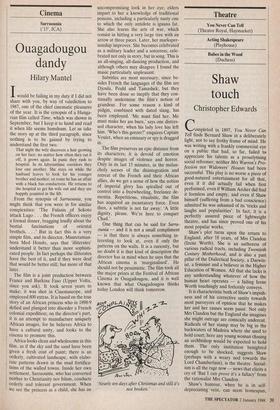Cinema Sarraounia (`15', ICA)
Ouagadougou dandy
Hilary Mantel
Iwould be failing in my duty if I did not share with you, by way of valediction to 1987, one of the chief cinematic pleasures of the year. It is the synopsis of a Hunga- rian film called Time, which was shown in September, but I keep it to hand and read it when life seems humdrum. Let us take the story up at the third paragraph, since nothing is to be gained by trying to understand the first two.
That night the wife discovers a hair growing on her face: no matter how often they cut it off, it grows again. In panic they rush to hospital. In its labyrinthine corridors they lose one another. She stays on while the husband leaves to look for his younger brother and mother; en route he has an affair with a black bus conductress. He returns to the hospital to get his wife out and they are happily reunited in the lift.
From the synopsis of Sarraounia, you might think that you were in for similar complexities: 'The Fulanis of Sokoto attack Lugo . . . the French officers enjoy a formal dinner, bragging loudly about the bestial fascinations of oriental brothels. . . .' But in fact this is a very simple film, and its director, Mauretanian- born Med Hondo, says that 'illiterates' understand it better than more sophisti- cated people. In fact perhaps the illiterates have the best of it, and if they were deaf that would be better still; but more of that later.
The film is a joint production between France and Burkina Faso (Upper Volta, since you ask). It took seven years to make; it was shot in Cinemascope, and employed 800 extras. It is based on the true story of an African princess who in 1898-9 defied and plunged into disorder a French colonial expedition; on the director's part, it is an attempt to manufacture uniquely African images, for he believes Africa to have a cultural unity, and looks to the cinema to promote this.
Africa looks clean and wholesome in this film, as if the sky and the sand have been given a fresh coat of paint; there is an orderly, cultivated landscape, with elabo- rate patterns drawn in the mud fortifica- tions of the walled towns. Inside her own settlement, Sarraounia, who has converted neither to Christianity nor Islam, conducts orderly and tolerant government. When we see the princess as a child, she has an uncompromising look in her eye; elders impart to her a knowledge of traditional poisons, including a particularly nasty one to which the only antidote is iguana fat. She also learns the arts of war, which consist in hitting a very large tree with an arrow at three paces. Later, her marksper- sonship improves. She becomes celebrated as a military leader and a sorceress; cele- brated not only in story, but in song. This is an all-singing, all-dancing production, and although others may disagree I found the music particularly unpleasant.
Subtitles are most necessary, since be- sides French the languages of the film are Djoula, Peuhl and Tamashek; but they have been done so ineptly that they con- tinually undermine the film's notion of grandeur. For some reason a kind of pidgin, combined with dated slang, has been employed. 'Me must find her. Me must make her ass burn,' says one distres- sed character, when his lady love has left him. 'Who's this geezer?' enquires Captain Voulet, when an emissary or spy is dragged in.
The film preserves an epic distance from its characters; it is devoid of emotion despite images of violence and horror. Only in its last 15 minutes, in the melan- choly scenes of the disintegration and retreat of the French and their African allies, do we get a sense of how the notion of imperial glory has spiralled out of control into a freewheeling, freelance de- mentia. Repetitious, ritualistic, the film has acquired an incantatory force. Even then, a subtitle is not far away: 'A little dignity, please. We're here to conquer Chad.'
One thing that can be said for Sarra- ounia — and it is not a small compliment — is that there is always something in- teresting to look at, even if only the patterns on the walls. It is a curiosity, but no doubt it is that kind of description the director has in mind when he says that the African cinema is 'marginalised'. He should not be pessimistic. The film took all the major prizes at the Festival of African Cinema in Ouagadougou, and it is well known that what Ouagadougou thinks today London will think tomorrow.
'Nearly ten days after Christmas and still it's not broken.'










































 Previous page
Previous page